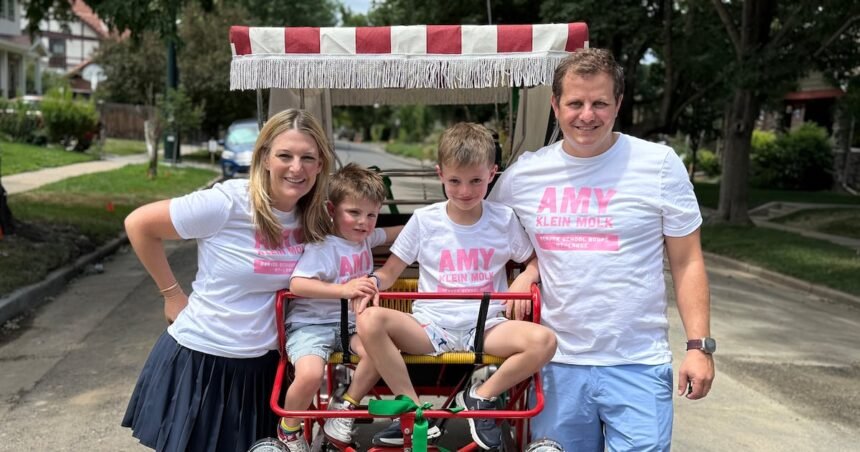Sign up for Chalkbeat Colorado’s free daily newsletter to get the latest reporting from us, plus curated news from other Colorado outlets, delivered to your inbox.
A mother who launched an educational technology company during the pandemic and spent the past year working as a paraprofessional at her family’s neighborhood school is running for an at-large seat on the Denver school board.
Amy Klein Molk, who described herself in an interview as “a big supporter of our traditional neighborhood schools,” is vying for the at-large seat currently held by Scott Esserman. Esserman is running for reelection but for a different seat.
Klein Molk, 41, has been endorsed by the Denver Classroom Teachers Association. She will face at least one opponent for the at-large seat. Klein Molk lives in the Park Hill neighborhood in east Denver, but the at-large seat represents the entire city.
“The reason I wanted to run for the board is that I believe in protecting our neighborhood schools and supporting our teachers,” Klein Molk said. “My experience is unique and powerful, and I feel that it’s time to get back to my policy roots and really affect change.”
Four seats on the seven-member Denver school board are up for grabs in November. Board members backed by the teachers union currently hold a majority of seats, but that could change in the Nov. 4 election, which comes at a key time.
Declining enrollment in Denver Public Schools has led to more than a dozen school closures in the past two years, and a new policy for low-performing schools could result in more closures.
The district’s graduation rate is up, but some students are still recovering from pandemic-era learning loss. DPS has found itself in the crosshairs of the Trump administration over an all-gender restroom and its support for immigrant students. And the board recently ordered an investigation of one of its members over allegations of racial discrimination.
Klein Molk said she grew up in Denver but graduated from the neighboring Cherry Creek School District. She has two children: a 9-year-old who attends a district-run elementary school and a 4-year-old who will go to preschool this fall at a different district-run school. She did not want to name the schools to protect her children’s privacy. Klein Molk said she serves as president of the parent-teacher organization at her 9-year-old’s school.
Klein Molk studied public policy and worked for the Creative Artists Agency Foundation, the philanthropic arm of a Hollywood talent agency. In that job, she said she did advocacy for the Head Start preschool program and other education-related organizations.
In 2020, Klein Molk launched a company in Denver called Beanstalk that produced educational videos she described as being “on the Magic School Bus and going to the pyramids or your local zoo.” As schooling went remote, Klein Molk decided to offer Beanstalk free of charge. When that was no longer viable, she shuttered the company.
From there, Klein Molk said she wanted to understand the school system. So she took a job as a paraprofessional at Park Hill Elementary, working one-on-one with students with disabilities.
If elected, Klein Molk said she’d focus on rebuilding trust within DPS. To do that, she said the district needs to recruit and retain the best teachers and pay them a fair wage. Special education staff, in particular, should have manageable caseloads, she said.
“Parents just don’t feel confident our school system can give their kids what they need,” she said. “We’ve got to rebuild this trust and help teachers feel supported.”
With her background, Klein Molk said she sees a “tremendous opportunity” to bring more technology into the schools in a way that doesn’t replace teachers but makes their lives easier.
Klein Molk said she supports the board’s recent decision to close seven schools and partially close three more due to low enrollment, calling it “necessary.” But she said she’s not eager to repeat it. Nor does she believe in closing schools for low test scores.
However, she said the board will need to make difficult decisions. A new board policy requires DPS to regularly analyze and adjust school boundaries.
“When we look at boundary lines and some schools that are super high performing getting bigger and bigger, tough decisions are going to have to be made,” Klein Molk said. “I’m not afraid to tell people we need to make big changes if we want to create an equitable system.”
One of the board’s biggest tasks is to manage the superintendent. Klein Molk said that if a superintendent is meeting his or her goals, their contract should be renewed.
“Maybe there’s opportunity for improvement, maybe there’s not,” she said of the superintendent evaluation process, “but until you’re in that room with your six other colleagues talking about how and why decisions were made, it’s not appropriate to make any judgements.”
Melanie Asmar is the bureau chief for Chalkbeat Colorado. Contact Melanie at masmar@chalkbeat.org.











